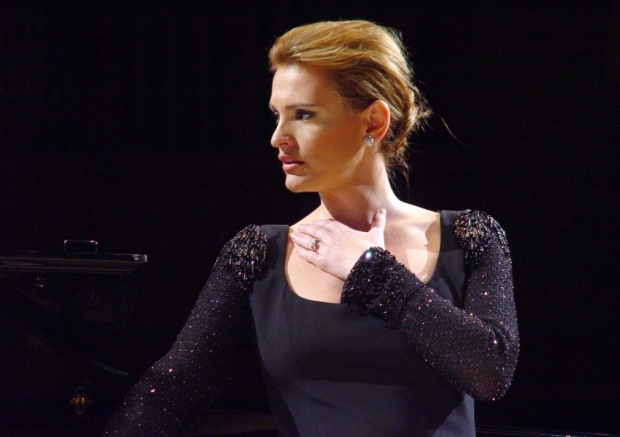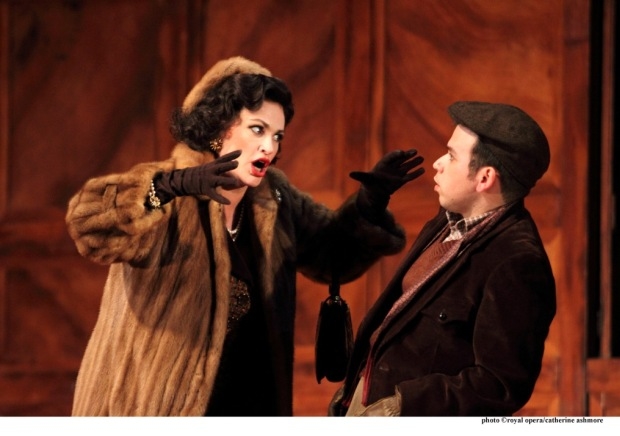Ainhoa Arteta: on heroines and horses
The Spanish soprano sings Alice Ford in ”Falstaff” at The Royal Opera

Tolosa-born soprano Ainhoa Arteta treads the operatic boards pretty much everywhere in the world. She's sung all the great lyric soprano roles from Mimì at the Met to Marguerite in Munich, but this summer Arteta is playing only her second-ever engagement at the Royal Opera House. We met backstage during rehearsals for Verdi's Falstaff.
How does Covent Garden differ from opera houses in the USA and the rest of Europe?
I have to say the system of working is pretty similar to the Met in New York. It's a Nordic system so quite different from Spain or Italy — the more Mediterranean countries, let's say — where things are much more open and relaxed. But I like the way it works here because we don't leave anything to improvisation, which means we go on stage in a much more secure way.
When it's a revival, as with Falstaff, are you free to bring your interpretation to it?
Of course you have to respect what's already been done, but normally stage directors want to see what you can bring to the role. Because we all have our own ideas. The production has a shape, but they listen to a singer's sense of the character's personality and they respect you. And my work will always be better when something happens because I'm convinced about it.
I rarely have problems with directors. If they have good reasons to want something and they really convince me, I accept it. And the contrary is also true.
Robert Carsen's production of Falstaff is a lot of fun. Have you met the horse yet?
No, but I'm dying to! My husband is a professional horse rider and at home we're very much involved with horses, so I'm looking forward to meeting this one.
Alice Ford is a fascinating role because she's the most human person in the whole opera.
She's a real woman with a real experience of life. And I'm approaching the role at a point in my life when I really feel I'm Alice. I'm married, I have children… one of my daughters could be Nanetta! It's a fabulous role for a mature woman with an experience of life.
But she doesn't hold the stage with a great aria.
No. She has big moments but not a showy aria. Falstaff is not about big arias though. It's very different from Verdi's other operas. It's the last opera he wrote and the warmest: it says 'everything in life is a joke'. I think in his old age he arrived at the conclusion that we take life too seriously. Half of the world is laughing at the other half, so let's just laugh together. When I sing the big heroines like Tosca and Adriana Lecouvreur they're going through very dramatic and intense emotional experiences; then I get to Alice and I realise she too has probably had dramas in her life, but she's over them.

© Catherine Ashmore
Alice mostly appears in ensembles. This must be very pleasant to rehearse, but once onstage you have to rely on each other.
Absolutely! This is an ensemble opera, it's not driven by soloists. We need the complicity of our colleagues and a good ambiance. It's only my second Falstaff — the first was in San Francisco with Bryn Terfel — and we're having a great time now just as we did then. At the beginning of my career I was a choral singer, and that demands a different philosophy of singing because everyone depends on each other. So you're always considerate of your colleagues. And this opera makes me work in that way too.
Do you have any mountains left to climb?
The biggest mountain is to continue my career and be able to finish it when I choose to, not stop because I can't manage it any more. I'm not looking for any special new roles; I'll just keep singing because I have a passion for what I do.
Do you keep an eye (or, rather, ear) on your changing voice? Do you say 'this role is no longer for me' and 'that's one I might try'?
Always. The voice for me is the only living musical instrument: it's made of flesh and blood so you have to listen to it. I always remember the advice Alfredo Kraus once gave me: "You have to always listen to your voice and never coerce it". That's the smartest advice I ever had.
That can't be easy when you have to book your diary three or four years ahead.
No! And sometimes it's frustrating because you say yes to things and you expect to be there, but your body isn't mathematical. You're human! Some theatres don't understand that a singer sometimes has to say no to a role. Today I may say yes to a Butterfly in five years' time but if my voice changes and it no longer feels right I want to be able to say "Find someone else". But some opera house directors take it badly and they punish you, even though it's good for them too if I say no to a role I no longer feel comfortable singing. I'm being honest with them.
I don't think any singer likes to cancel. In my case, if something brings me all the way here it's because I have a passion for what I do. So if I ever have to say no there'll always be a good reason. It makes me upset when I read in the press that a colleague has cancelled and the opera house got upset. I just don't get it. The singer has a responsibility to his or her instrument, and to take care of it.
When do we see you back in London?
As soon as they call me! I love this city and this opera house, so I'll always be happy to come back.













